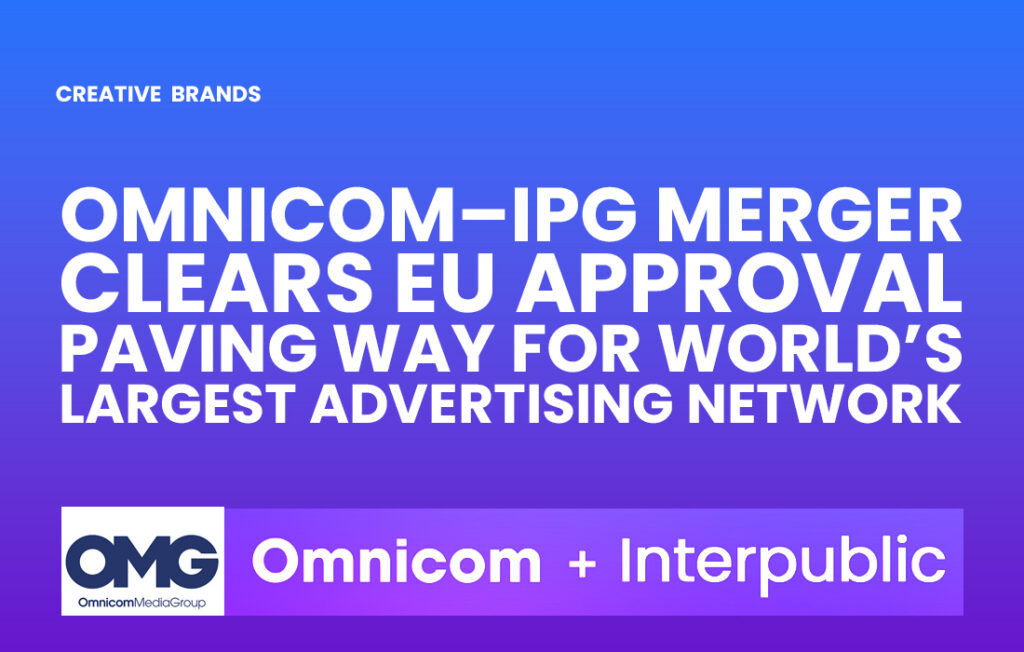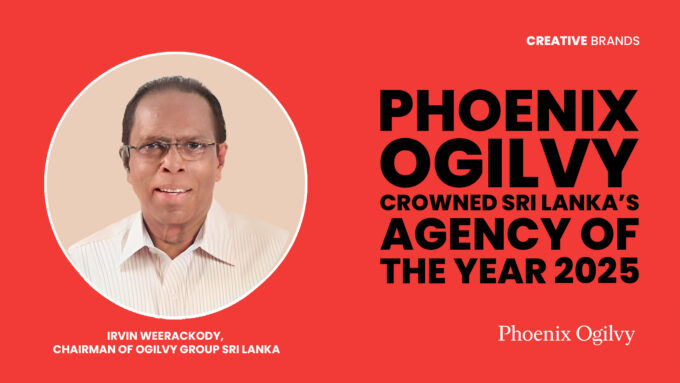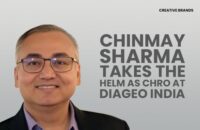The European Commission has granted unconditional approval for Omnicom’s $13.25-billion acquisition of Interpublic Group, concluding the deal poses no competition risk in the EEA. With the final regulatory hurdle removed, the all-stock merger is set to close, reshaping the global advertising landscape and creating the industry’s largest holding network.

Omnicom’s proposed $13.25-billion acquisition of Interpublic Group — a move that would create the world’s largest advertising holding company — has cleared one of its most critical regulatory hurdles, with the European Commission granting unconditional approval under EU Merger Regulation. The decision removes the final obstacle to the completion of the industry-shaping all-stock merger, which Omnicom had earlier indicated could be finalised within 48 hours of receiving the EU’s green light. With this approval, the global advertising landscape is poised for one of its most dramatic consolidations in decades, reshaping agency competition, media buying power and client dynamics across global markets including Europe, North America and Asia.
The Commission’s decision followed an extensive investigation into whether the merger would reduce competition in the European Economic Area across national markets involved in marketing communication services and media buying. Its conclusion — that the merger poses no competitive risk — sets a powerful precedent for how regulators view concentration in the advertising sector at a time when digital transformation, retail media, data ownership and AI-driven content are blurring lines between agencies, technology companies and media platforms. According to the official ruling, the combined Omnicom–IPG entity would still hold only moderate market positions across the sectors examined, and crucially, would continue to face significant constraints from other large international networks such as WPP, Publicis, Dentsu–Aegis and Havas. This assessment was the basis for granting unconditional approval, without requiring any divestments or behavioural remedies.
The Commission also made it clear that advertisers would have continued freedom to switch agencies if they were faced with higher prices or diminished service quality following the merger. Regulators pointed to three structural characteristics of the marketing services industry that safeguard competition: the bidding-based nature of most agency contracts, the relatively short contract duration typical in the sector, and the relatively low switching costs incurred by brands when moving to competing agencies. These characteristics, the ruling noted, position clients to retain leverage even in a more consolidated agency ecosystem. On the media buying side, the Commission concluded that media owners — including broadcasters, streaming players and large digital platforms — remain highly concentrated, granting them sufficient countervailing power against any attempt by the combined Omnicom–IPG entity to impose new commercial terms.
The approval arrives amid a period of accelerating change for traditional advertising holding companies, with each navigating market pressure differently. Analysts have described the moment as signalling the “end of the old guard,” with Publicis outperforming peers due to heavier investments in data and technology platforms and WPP continuing to face turbulence driven by restructuring cycles, cost pressure and competitive fragmentation. Havas has recorded strong growth on the back of focused acquisitions and improved operational stability, while Omnicom has moved aggressively toward scale — not only for revenue expansion, but to build deeper capabilities in precision marketing, digital commerce and AI-enabled creative production. In this context, acquiring IPG is widely considered a defensive and offensive play for Omnicom: a way to secure size in an increasingly competitive market while integrating complementary strengths from IPG’s portfolio.
The deal also reflects the shifting economics of advertising, where scale is no longer driven by traditional creative muscle alone but by mastery of data, retail media ecosystems, performance marketing, owned audience networks and enterprise-level content automation. Both Omnicom and IPG have invested heavily in these areas, though neither currently operates a proprietary technology platform at the scale of Publicis Sapient’s Epsilon or WPP’s OpenX. Analysts now expect the merger to accelerate the combined group’s ability to negotiate long-term data partnerships, invest in AI-driven measurement solutions and expand its global media buying footprint, particularly across emerging markets. At a time when brands in categories including automotive, CPG, retail, luxury, gaming and entertainment are funnelling spending into retail media networks, social commerce and immersive experience formats, the merger positions the combined entity to compete for large multi-market transformation mandates rather than siloed campaigns.
News of the approval also comes in the wake of significant restructuring at IPG. By September 2025, the company had already cut 3,200 jobs ahead of the takeover, a move intended to streamline cost structures, integrate duplicated capabilities and position the business for merger-driven efficiencies. While reductions of this scale underscore the pressures facing the industry, Omnicom has emphasised that the goal of the merger is not only consolidation but the creation of an integrated global organisation with shared investment capability rather than overlapping agency assets. Investors and analysts are now watching closely for internal brand architecture decisions: whether the holding company will retain all agency banners under a multi-brand portfolio strategy or merge select flagship agencies to simplify capabilities for global clients.
The Commission’s approval marks one of the most significant regulatory moments in the advertising sector since the late-1990s and early-2000s wave of mega-mergers that shaped the modern holding-company era. But unlike that era — when consolidation was driven primarily by globalisation, expanded media channels and multinational brand structures — today’s consolidation is fuelled by data, AI, digital identity resolution and platform convergence. Regulators appear to have acknowledged that the locus of power has shifted outward from agencies to digital ecosystems. Google, Meta, Amazon, Netflix, Disney, retail media groups, gaming platforms and telecom-owned advertising networks now compete directly in media monetisation. Against this backdrop, regulators saw little risk of an agency holding company acquiring “excessive” bargaining power.
Now that approval is complete, attention shifts to how quickly Omnicom will execute integration across markets, clients and leadership. Financial analysts expect an accelerated integration roadmap with regional structure announcements, shared technology investments and cross-portfolio client migration likely within the first 18 months. Client response will be closely watched, as the sector has historically seen major account movements triggered by mergers when advertisers seek to avoid conflicts of interest or find themselves newly aligned with their competitors under the same holding-company umbrella. The bidding-oriented and low-switching-cost nature of the market means that the combined entity could gain — or lose — key global mandates depending on how the transition is perceived.
The EU green light also raises the question of whether this is the beginning of a new wave of consolidation among the major holding companies. With the Omnicom–IPG merger creating a group of unprecedented scale, other networks may face pressure to accelerate acquisitions of their own, particularly in high-growth areas such as digital experience, gaming, machine learning-driven content creation and retail media. Some analysts predict that this merger will push WPP and Dentsu toward increased acquisition activity to maintain parity in capability and global reach; others believe the future will favour holding companies with strong proprietary platforms rather than increased agency count.
For now, the advertising industry stands at a crossroads. The unconditional EU approval confirms not only the legality of the transaction but the end of debate over whether such consolidation threatens competition in Europe. The coming months will reveal whether Omnicom’s historic acquisition of IPG catalyses a new era of scale-driven innovation — or triggers fresh competition from smaller, more agile agency networks and consulting-technology hybrids. What is certain is that the world of advertising will look very different from 2026 onward, and the Omnicom-IPG merger is now set to become one of the defining forces behind that transformation.
Discover more from Creative Brands Mag
Subscribe to get the latest posts sent to your email.
















Leave a comment